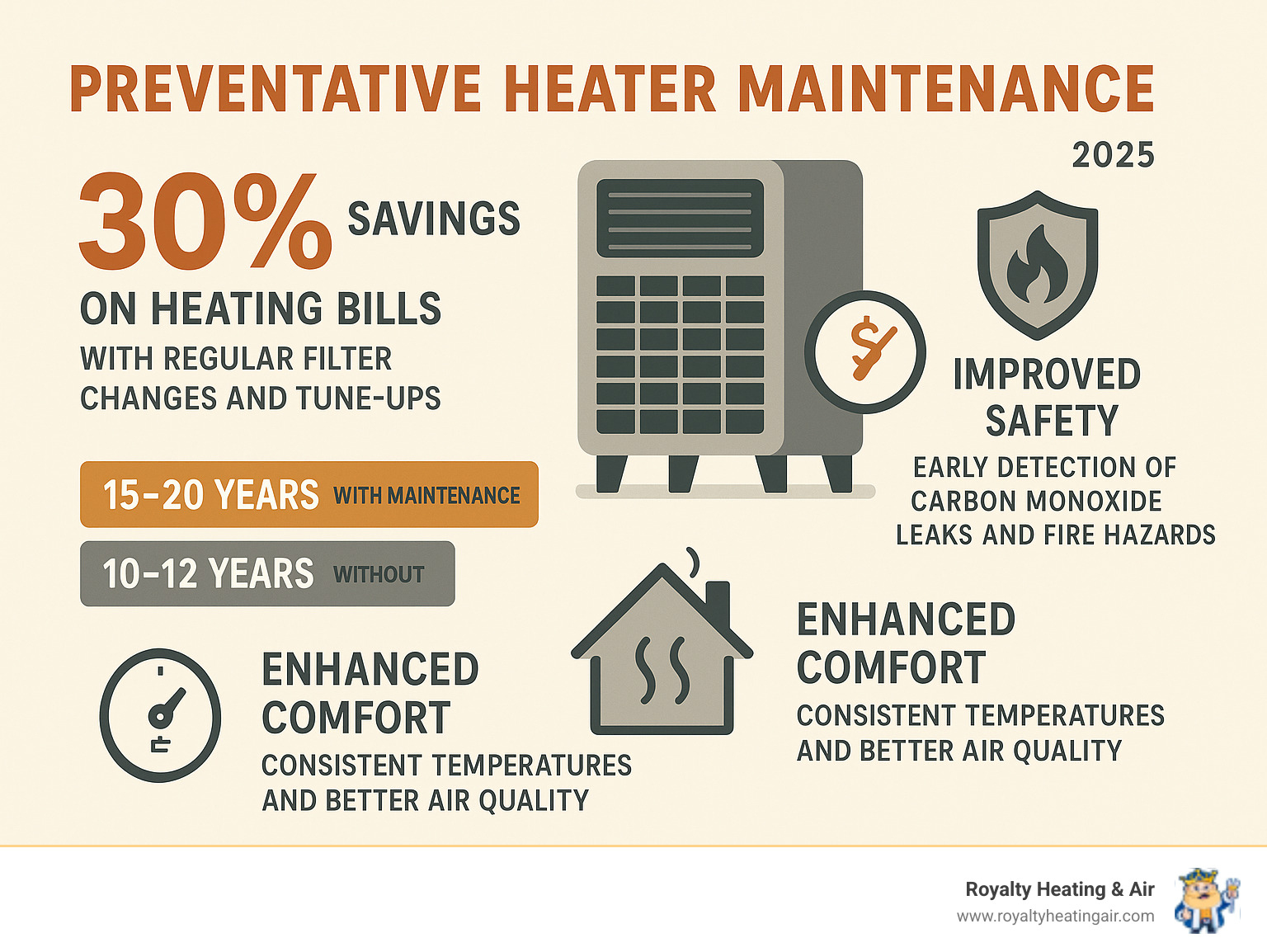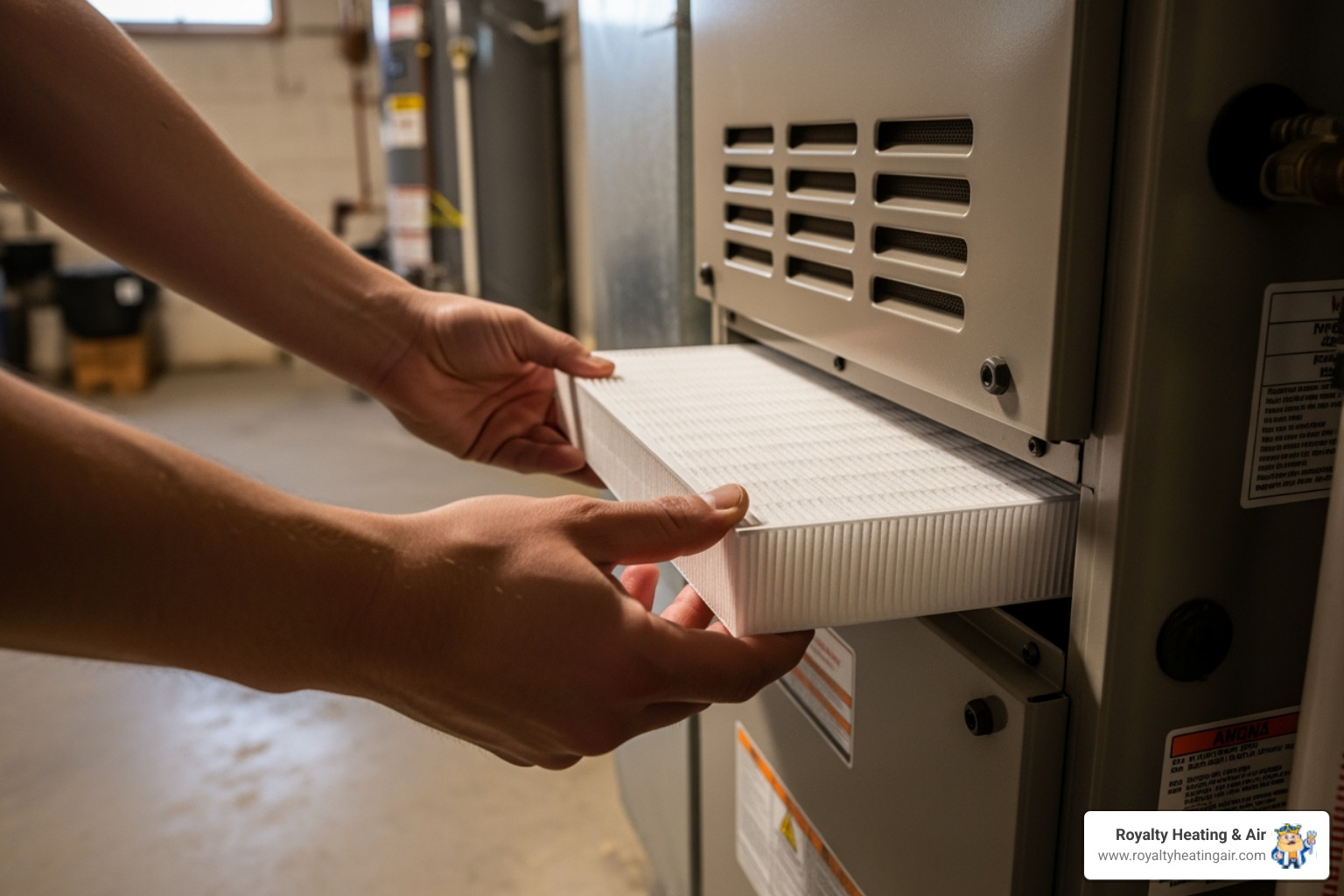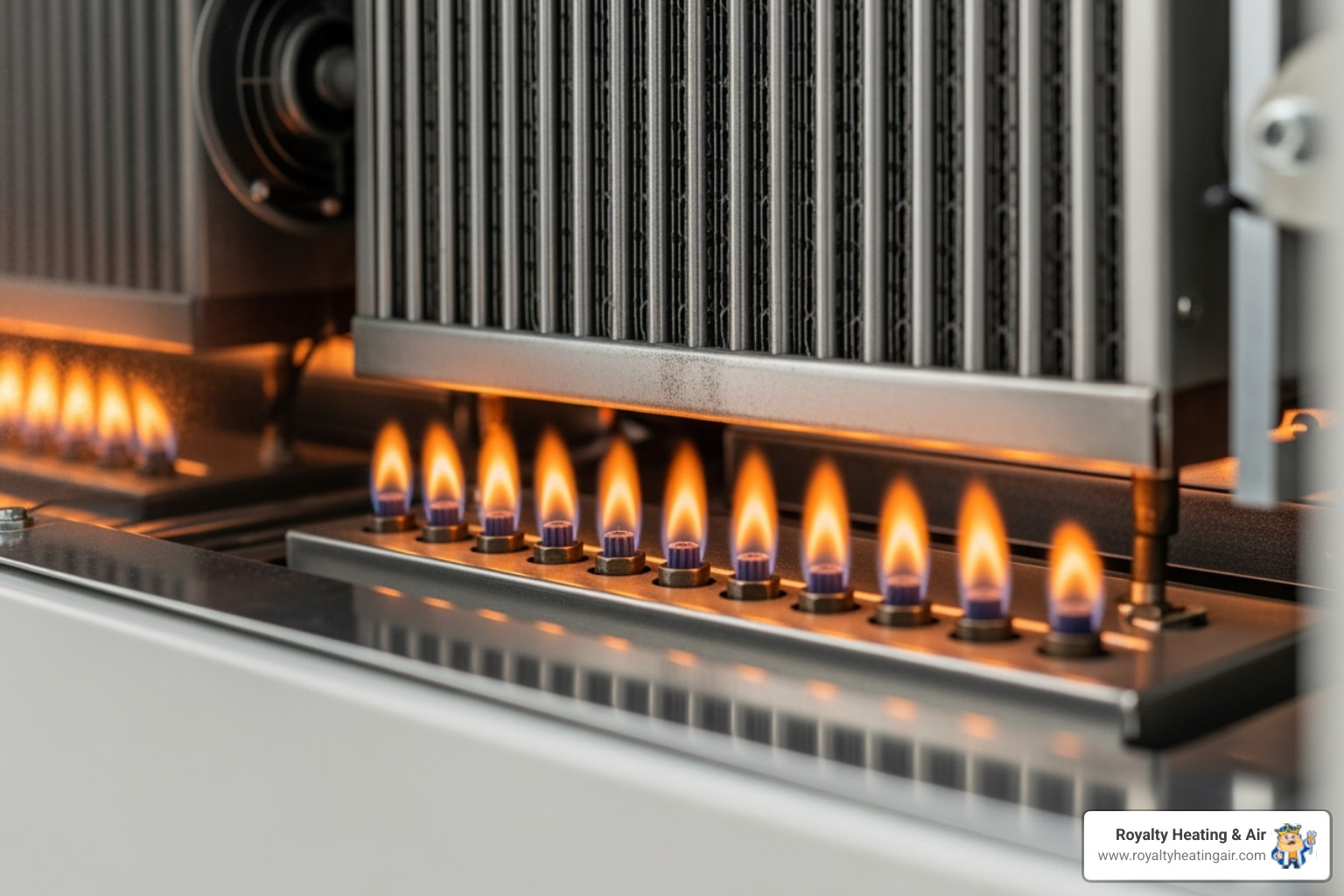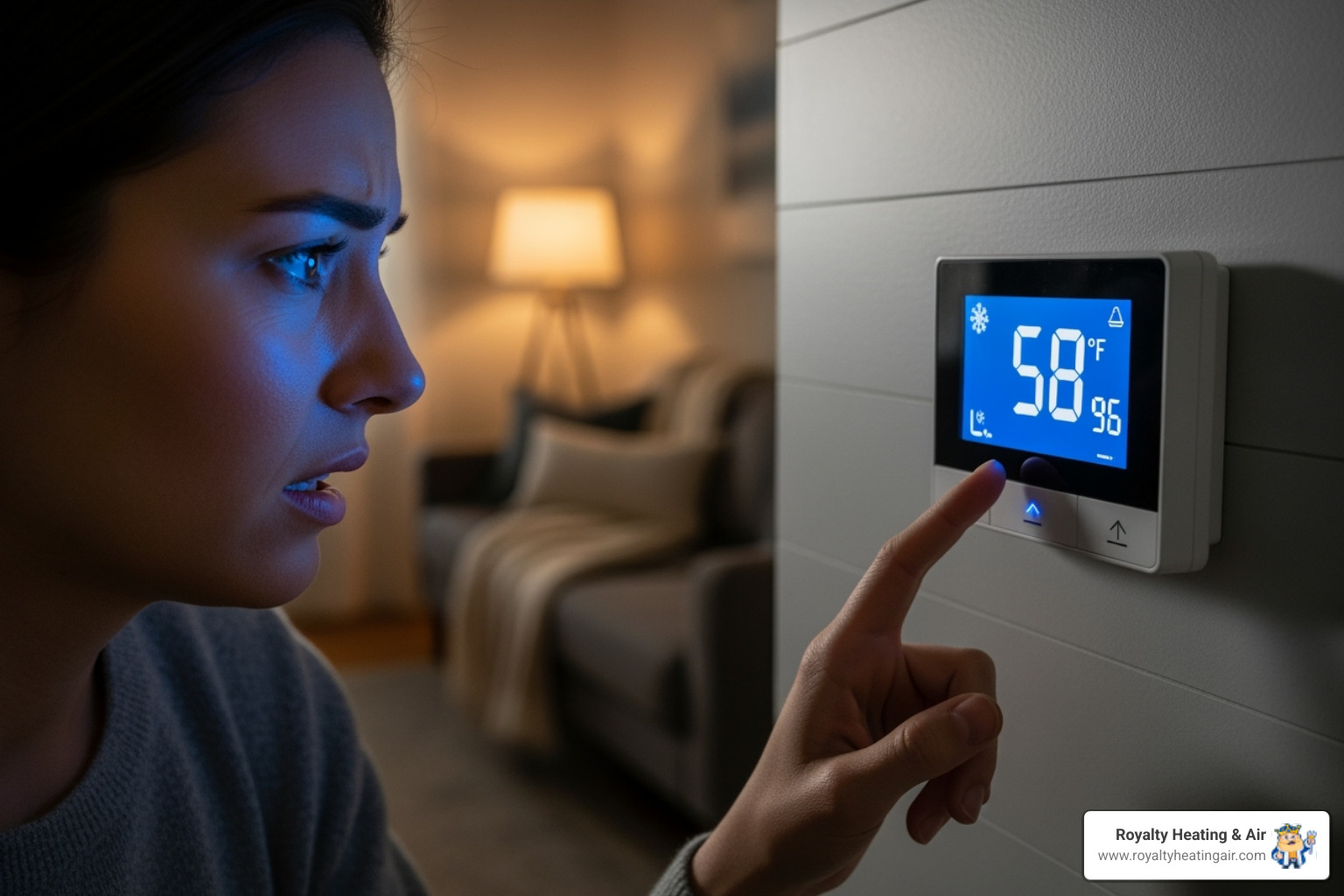Preventative heater maintenance means caring for your heating system with regular inspections, cleaning, and tune-ups before problems arise. Key tasks include monthly filter changes, seasonal vent cleaning, and annual professional inspections of the heat exchanger, burner, and safety controls.
Think of it like changing the oil in your car—a small, regular investment that prevents major breakdowns.
The numbers tell the story. A well-maintained heating system can save you up to 30% on your heating bills, according to industry data. Your system will also last significantly longer—a properly maintained furnace can operate efficiently for 15-20 years, while neglected units often fail within 10-12 years.
Beyond money, regular maintenance catches dangerous issues like cracked heat exchangers that could leak carbon monoxide into your home. It also means no more middle-of-the-night heating emergencies when temperatures drop.
That "burning dust smell" when you first turn on your heater is the mildest sign of neglect. Ignored systems lead to expensive repairs, wasted energy, and potential safety risks. The good news is that while some tasks require professional expertise, many preventative steps can be done by any homeowner.

Imagine your heater quitting on the coldest night of the year in Lincoln. This costly emergency is the reality of reactive maintenance—waiting for a problem to happen. Our philosophy at Royalty Heating & Air, and the core of preventative heater maintenance, is to avoid these stressful scenarios entirely. By regularly inspecting your system, we catch minor issues before they become major breakdowns.
Beyond comfort and cost, there are serious safety implications. Neglecting maintenance can lead to carbon monoxide leaks from a cracked heat exchanger or fire hazards from frayed wiring. A proactive approach means peace of mind, knowing your heating system is operating safely and efficiently.
A well-maintained HVAC system can save you up to 30% on heating bills, which often account for over half of your monthly utility costs. Preventative maintenance ensures all components work optimally—clean filters, grime-free coils, and lubricated parts mean your system uses less energy.
This efficiency boost also extends your system's lifespan. With proper care, furnaces can last 15-20 years or more, while neglected units fail much sooner, leading to premature and expensive replacements. By reducing friction and ensuring proper airflow, we help your heater live its longest, most efficient life. For more on keeping your system running smoothly, check out our guide on the Importance of Routine Vent Cleaning.
Think of heater maintenance like car care. You handle the basics, but call a mechanic for engine trouble. The same applies to your heating system. Homeowners in Roseville, Rocklin, or Granite Bay can perform simple, impactful tasks, but some jobs require a professional's specialized tools and training. Our goal is to empower you to handle the basics and know when to call us. This partnership keeps your system running smoothly.

You don't need fancy tools or technical expertise—just a few minutes each month can keep your system happy.
While DIY maintenance covers the basics, some situations require professional expertise and specialized tools.
Different heating systems have unique maintenance needs. Gas furnaces require a focus on combustion safety, while heat pumps need attention to their refrigerant and dual-function components. Both need filter changes and electrical checks, but the specifics matter. For furnaces, we prioritize heat exchanger and burner cleaning for safety. For heat pumps, we check refrigerant levels and clean coils for efficiency. A comprehensive checklist ensures no critical component is missed, preventing future repairs.
Your furnace needs regular attention to stay safe and efficient. Our preventative heater maintenance is a thorough physical exam for your system.

Our comprehensive Furnace Maintenance Services cover all these critical areas.
Heat pumps heat in winter and cool in summer, so they need specialized preventative heater maintenance to perform year-round.
Our Heating Maintenance services ensure your system is ready for any season.
Supplemental heat sources also need maintenance, with a heavy focus on safety.
Your heating system sends out warning signals long before it fails completely. Learning to recognize these signs—communicated through sounds, smells, and performance changes—allows you to address issues before they become emergencies.

Your heater should operate quietly. When it starts making strange noises, it's time to pay attention.
Subtle changes in how well your heater does its job are also important red flags.
Here are the answers to what our neighbors in Roseville, Rocklin, and beyond most want to know about preventative heater maintenance:
The golden rule is once a year, every year, ideally in the fall before the heating season begins. Factors like heavy usage or an older system might warrant more frequent checks. Most importantly, many manufacturer warranties require annual professional maintenance to remain valid. Skipping a tune-up could void your warranty, leaving you to pay for repairs that should have been covered. For heat pumps, we recommend biannual service (spring and fall) to cover both heating and cooling functions. Learn more about scheduling your annual care with our Heating Tune-Up Services.
Air filter replacement is by far the most impactful DIY task. A clogged filter restricts airflow, forcing your system to work harder, which increases energy use and causes premature wear on components. It also degrades your indoor air quality. Check your filter monthly and replace it every 1-3 months. Homes with pets or occupants with allergies may need more frequent changes.
Even if your heater seems to be working fine, you should not skip annual maintenance. Many serious issues, like a cracked heat exchanger that can leak carbon monoxide, develop silently. A professional tune-up catches these hidden problems before they become dangerous or lead to a major breakdown. Skipping service also leads to gradual efficiency loss, meaning you pay more on utility bills without realizing it. Proactive care prevents expensive future repairs and addresses safety risks you can't see. Consistent annual maintenance is the best way to protect your investment and your family.
Winter in Roseville doesn't have to be a season of worry about your heating system. Throughout this guide, we've shown you how preventative heater maintenance transforms from a simple home care routine into your family's shield against cold nights, high energy bills, and unexpected breakdowns.
The benefits speak for themselves: up to 30% savings on your heating bills, a system that can last 15-20 years instead of failing within 10-12, and most importantly, the peace of mind that comes from knowing your family is safe from carbon monoxide leaks and fire hazards. These aren't just numbers on a page – they represent real comfort and security for families throughout Granite Bay, Lincoln, and beyond.
You're not alone in this journey. We've equipped you with the knowledge to handle essential DIY tasks like changing air filters and keeping vents clear. But we've also shown you exactly when to call in professional expertise for those deeper inspections and complex tune-ups that keep your system running at its best.
At Royalty Heating & Air, we see ourselves as more than just your HVAC service provider. We're your neighbors, committed to keeping our community warm and safe. This commitment extends beyond heating systems – that's why we're proud partners with the MackAttack Foundation, supporting foster babies and sponsoring family adoptions. We believe that everyone deserves a warm, loving home, and we're honored to play a part in making that happen.
Your heating system is the heart of your home's comfort, and it deserves the same care and attention you give to everything else you value. Whether you need an annual tune-up, have concerns about strange noises, or want to establish a maintenance routine that protects your investment, our expert team is ready to help.
Don't wait for that middle-of-the-night breakdown when temperatures drop. Take charge of your home's comfort today.
For comprehensive heating services in Roseville and surrounding Service Areas, trust our expert team to keep your system running perfectly. Schedule your heating repair in Roseville, CA today!.
